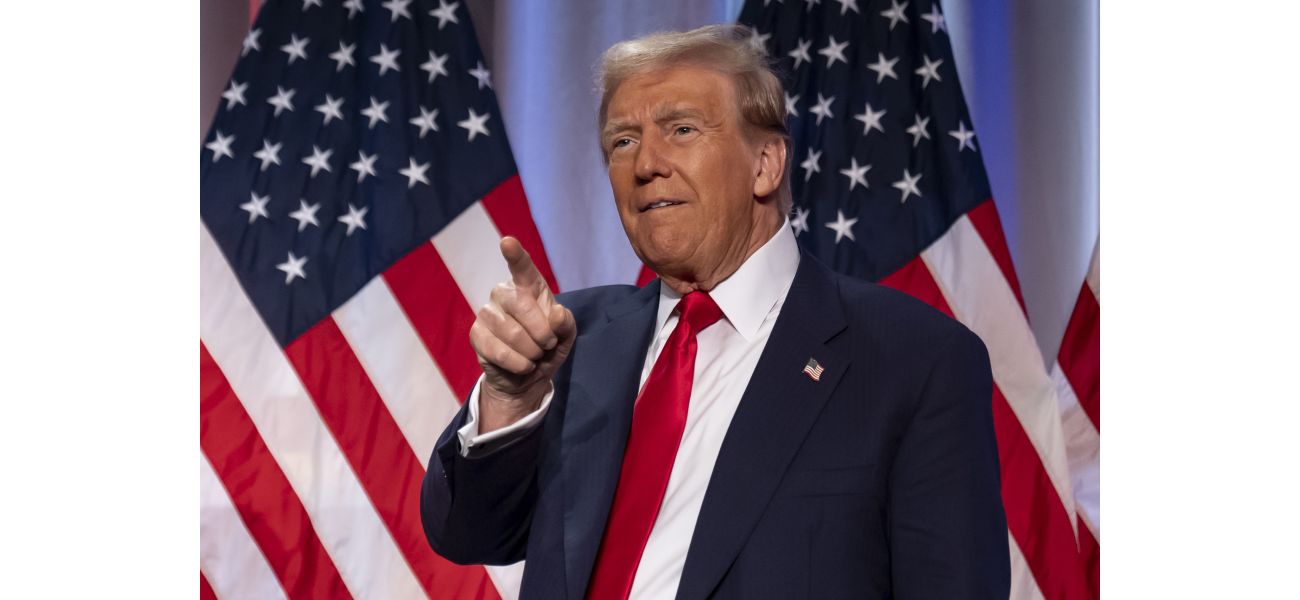Is it fair for Trump to blame China for the fentanyl crisis?
Trump plans 10% tariff on Chinese imports, blaming them for US drug problems. But is China truly responsible for the crisis?
November 28th 2024.

Donald Trump recently made a bold statement, threatening to impose hefty tariffs on China and other nations for their failure to control the flow of drugs into the United States. As the president-elect, he plans to implement a 25 percent tariff on imports from China, Mexico, and Canada upon taking office. However, Trump has gone a step further in his approach towards China, specifically addressing their role in the opioid crisis that has claimed the lives of thousands of Americans every year.
In a post on his Truth Social site, Trump declared his intention to impose an additional 10 percent tariff on Chinese imports until the flow of illicit drugs, particularly fentanyl, is brought to a halt. He expressed frustration over his numerous discussions with China regarding this issue, but to no avail. However, China has refuted Trump's accusations and defended its efforts in combating the illegal drug trade.
A spokesperson from the Chinese foreign ministry asserted that their country has strict policies and strong implementation when it comes to countering narcotics. They also mentioned their support for the US in addressing the fentanyl problem, citing it as a humanitarian gesture. But what exactly is fentanyl, and why is it such a pressing issue?
Fentanyl is a synthetic opioid that is known to be up to 100 times more potent than heroin, making it a major contributor to the drug overdose crisis in the US. In 2022 alone, it was linked to approximately 71,000 overdose deaths out of over 100,000 reported cases. Even the smallest dosage can prove to be fatal. This dangerous drug is mainly sourced from China, despite being smuggled into the US by Mexican cartels.
John Coyne, an expert in global law enforcement, explained that while the Chinese government may not be deliberately turning a blind eye to the issue, it is challenging to regulate the vast pharmaceutical and chemical industry in their country. With thousands of facilities involved, ensuring compliance with regulations is an uphill battle. Additionally, a US government inquiry has revealed that China has been supporting the production of chemical precursors used in making fentanyl, offering subsidies to companies in certain provinces.
Last year, discussions between Beijing and Washington regarding the fentanyl crisis began, with a meeting between President Joe Biden and Chinese leader Xi Jinping. China has since taken steps to schedule banned chemical precursors in an attempt to control their availability to the public. However, there has been little impact on the opioid crisis in the US. While China maintains that it is primarily a US issue, Coyne believes that their extensive security apparatus could play a crucial role in cracking down on the export of chemical precursors. He also dismissed claims by Trump and other US politicians that China is intentionally trying to undermine the US with fentanyl, stating that it is more of a lack of action on China's part.
In a post on his Truth Social site, Trump declared his intention to impose an additional 10 percent tariff on Chinese imports until the flow of illicit drugs, particularly fentanyl, is brought to a halt. He expressed frustration over his numerous discussions with China regarding this issue, but to no avail. However, China has refuted Trump's accusations and defended its efforts in combating the illegal drug trade.
A spokesperson from the Chinese foreign ministry asserted that their country has strict policies and strong implementation when it comes to countering narcotics. They also mentioned their support for the US in addressing the fentanyl problem, citing it as a humanitarian gesture. But what exactly is fentanyl, and why is it such a pressing issue?
Fentanyl is a synthetic opioid that is known to be up to 100 times more potent than heroin, making it a major contributor to the drug overdose crisis in the US. In 2022 alone, it was linked to approximately 71,000 overdose deaths out of over 100,000 reported cases. Even the smallest dosage can prove to be fatal. This dangerous drug is mainly sourced from China, despite being smuggled into the US by Mexican cartels.
John Coyne, an expert in global law enforcement, explained that while the Chinese government may not be deliberately turning a blind eye to the issue, it is challenging to regulate the vast pharmaceutical and chemical industry in their country. With thousands of facilities involved, ensuring compliance with regulations is an uphill battle. Additionally, a US government inquiry has revealed that China has been supporting the production of chemical precursors used in making fentanyl, offering subsidies to companies in certain provinces.
Last year, discussions between Beijing and Washington regarding the fentanyl crisis began, with a meeting between President Joe Biden and Chinese leader Xi Jinping. China has since taken steps to schedule banned chemical precursors in an attempt to control their availability to the public. However, there has been little impact on the opioid crisis in the US. While China maintains that it is primarily a US issue, Coyne believes that their extensive security apparatus could play a crucial role in cracking down on the export of chemical precursors. He also dismissed claims by Trump and other US politicians that China is intentionally trying to undermine the US with fentanyl, stating that it is more of a lack of action on China's part.
[This article has been trending online recently and has been generated with AI. Your feed is customized.]
[Generative AI is experimental.]
0
0
Submit Comment





